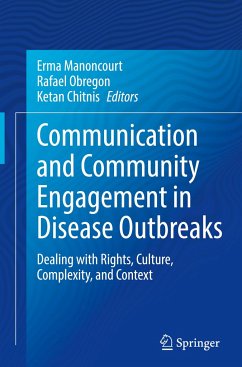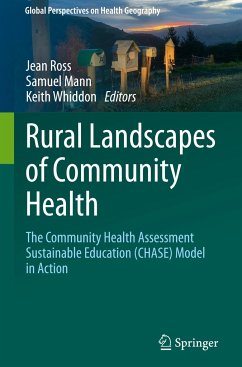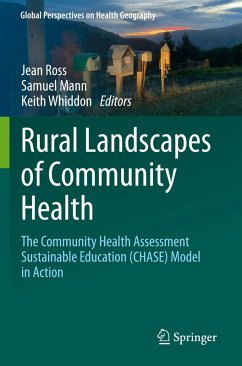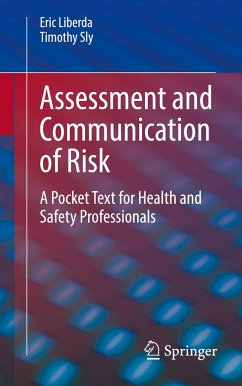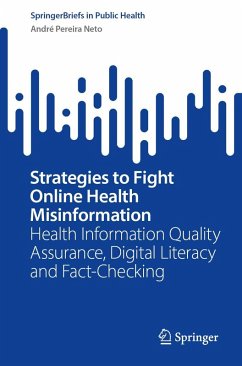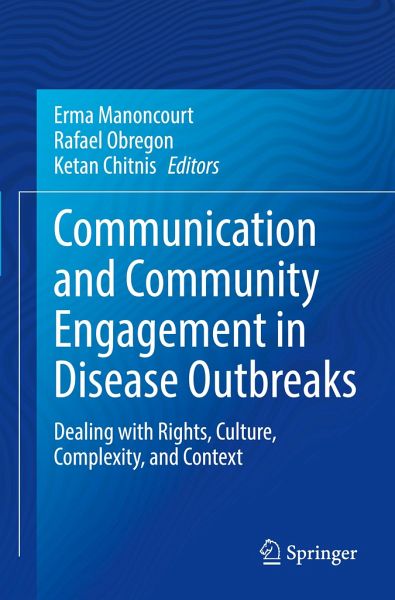
Communication and Community Engagement in Disease Outbreaks
Dealing with Rights, Culture, Complexity and Context
Herausgegeben: Manoncourt, Erma; Obregon, Rafael; Chitnis, Ketan
Versandkostenfrei!
Versandfertig in 6-10 Tagen
49,99 €
inkl. MwSt.

PAYBACK Punkte
25 °P sammeln!
This book provides readers with a critical, conceptual and applied understanding of the role of communication and community engagement for disease outbreak preparedness and response.Until the WHO declared COVID-19 a pandemic on March 11, 2020, for several years public health authorities and influential voices in the international public health community have warned of a pandemic and therefore a need to strengthen governments and communities' ability to prevent and respond to it effectively to minimize its impact on lives and economies. While investments have focused on clinical, diagnostic, an...
This book provides readers with a critical, conceptual and applied understanding of the role of communication and community engagement for disease outbreak preparedness and response.
Until the WHO declared COVID-19 a pandemic on March 11, 2020, for several years public health authorities and influential voices in the international public health community have warned of a pandemic and therefore a need to strengthen governments and communities' ability to prevent and respond to it effectively to minimize its impact on lives and economies. While investments have focused on clinical, diagnostic, and vaccine research, preventing and minimizing the impact of disease outbreaks requires a wider socio-ecological systems approach that places communities at the centre of the response. Such an approach is still rare in public health practice. One of the key lessons that the authors have learned, and on which they reflect in the chapters, is that technical inputswill be as effective as they are fully integrated within the broader architecture of disease outbreak preparedness and response. The ten chapters of this contributed volume are organized under three parts: a conceptual framework, case studies, and recommendations.
Communication and Community Engagement in Disease Outbreaks is a timely and essential resource for public health managers, donors, implementers, organizations engaged in disease prevention and control and academics called on to support the response. These audiences should benefit from this approach as the book highlights dimensions that are often under-resourced.
Until the WHO declared COVID-19 a pandemic on March 11, 2020, for several years public health authorities and influential voices in the international public health community have warned of a pandemic and therefore a need to strengthen governments and communities' ability to prevent and respond to it effectively to minimize its impact on lives and economies. While investments have focused on clinical, diagnostic, and vaccine research, preventing and minimizing the impact of disease outbreaks requires a wider socio-ecological systems approach that places communities at the centre of the response. Such an approach is still rare in public health practice. One of the key lessons that the authors have learned, and on which they reflect in the chapters, is that technical inputswill be as effective as they are fully integrated within the broader architecture of disease outbreak preparedness and response. The ten chapters of this contributed volume are organized under three parts: a conceptual framework, case studies, and recommendations.
Communication and Community Engagement in Disease Outbreaks is a timely and essential resource for public health managers, donors, implementers, organizations engaged in disease prevention and control and academics called on to support the response. These audiences should benefit from this approach as the book highlights dimensions that are often under-resourced.





